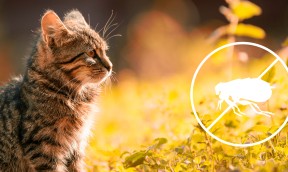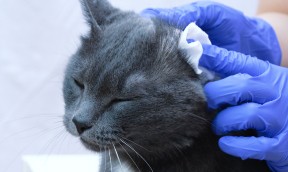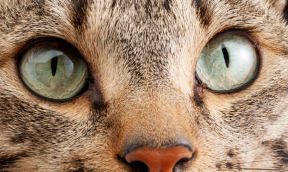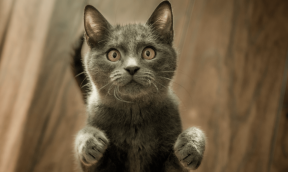
Is your cat stressed? Recognise the signs of unease to soothe your feline friend
Contents: Recognise situations that are stressful for cats | Learn about the impact of stress on cats and stay vigilant | Identify and help stressed cats | Create an action plan for your cat

Paw licking, evasive behaviour, aggression or even defecating or urinating outside the litter tray can mean your cat is trying to tell you something: he is unhappy, because something in his environment is worrying or scaring him. Stressed cats are fairly easy to recognise if you are attentive. Stress has a negative impact on your pet’s wellbeing and is detrimental to his health. Francodex helps you keep your feline friend relaxed for a more serene day to day!
Recognise situations that are stressful for cats
Noise, a new arrival in the home, change of environment, etc., discover the factors which promote the onset of stress reactions in cats.
Disrupted or new environment
Cats organise their lives based on space and time: they choose places to play, sleep and eat, depending on the time of day. Cats are particularly sensitive to changes in their living habits. A trivial change in their environment, such as re-organising rooms, new décor or changing a food bowl can represent potential sources of stress.
Cats love stability and consistency. You should not change your cat’s routine unless you have no other choice.
When moving house or going away on holiday, never underestimate the amount of stress that these events cause your pet.
Your cat can find a new scent or an unusual noise threatening. This extreme sensitivity to environmental features makes some cats particularly vulnerable.
Even a change in how food is dispensed can have an impact on your pet’s quality of life!
🙀 Take your pet on holiday or have someone take care of him at home? Each cat is unique. Some cats are willing to walk on a lead or travel with their owner, as they have become accustomed to this from a very young age. If you need to trick your cat to get into his carrier to go to the veterinary clinic, then consider the pros and cons of taking him with you on holiday. Some cats spend their holiday meowing in despair, while others try to escape, with a risk of injuring themselves. Upon your arrival, another problem will be to avoid losing your cat in an unfamiliar environment, and if your cat spends the whole holiday hiding under your bed, it would definitely be preferable to consider a less disruptive solution next time. You should ideally keep your cat at home and have a trusted friend pop in several times a day to take care of him.
Living with other pets or a new family member
Most cats are solitary creatures and can find it difficult living with others. Social relationships develop between cats who share the same territory, whether this is the house, garden or neighbourhood. The arrival and departure of a new cat changes these relationships, leading to a few fights until a new equilibrium is established, which constitutes a source of stress.
Likewise, if you have a new addition to your family or if one of your children leaves home, this change will cause your cat to become stressed. Cats can suffer from separation anxiety, especially with respect to their territory.
Boredom and lack of activity in cats’ daily lives
Cats who can go outside have many distractions: they fill their days playing and hunting, taking naps and interacting with other cats. Stressed cats may also get bored. If your feline friend is used to going outside every day and you prefer to keep him indoors, for instance, during a convalescence period, this situation will quickly cause your cat to become stressed, as will an environment not suited to his needs
Indoor cats need to be able to express the same behaviours as they do outside. A sufficiently stimulating environment will allow them to exercise and preserve their feline instincts. They will also enjoy spending time with you each day, with shared moments of bonding.
Appropriate physical exercise is essential to keep cats in good spirits and at a healthy weight. Indoor living is more complicated; however, cats greatly appreciate being on top of furniture and, better still, having specially designed spaces high up on the walls, shelves and walkways, instead of the low walls and trees which they enjoy climbing when outdoors.
😿 Abusive punishment and scolding: Does your cat get up to mischief? That’s just part of everyday life with our fur babies. Train your pet with kindness for a more pleasant day to day, and always with positive reinforcement when your cat gets up to mischief. Punishment and scolding cause pets to become stressed, and often take place too late after the event for them to understand the reason. Stressed or naturally anxious cats will not respond well to being scolded, which could even backfire by prompting with even more unwanted behaviours.
Learn about the impact of stress on cats and stay vigilant
Does your cat seem nervous or sad? The consequences of stress in cats may prove to be even more serious than you imagine. Focus on unwanted behaviours caused by stress in cats.
Behavioural signs of stress in cats
In nature, in response to danger, cats run away to hide in a safe place. Your cat may also hide in your home, but his ability to run away is often limited.
When cats are afraid or stressed, they might:
- become increasingly aggressive. They hiss, growl, bite, scratch, reject contact and their pupils dilate;
- change behaviour, develop phobias, or even self-harm by biting their skin or pulling out hair;
- meow intensely and constantly;
- show signs of depression, reduce their living space
- lick their paws until the skin becomes irritated
- modify their marking behaviour, or no longer express it at all
- start having “accidents” or become bulimic
Weakened immune system and urinary tract disorders in stressed cats
Excessive stress disrupts their immune system, by weakening their defences. Cats are then more likely to develop diseases.
For example, idiopathic cystitis in cats is a condition characterised by inflammation of the internal wall of the bladder, with no identifiable cause.
Scientific research has shown that this condition is often related to chronic stress in cats caused by repeated disruption to their environment.
This reaction is an inappropriate nervous system response to events that are stressful or traumatic for the animal.
Note that even stress caused by a visit to the veterinary clinic can alter your feline friend’s blood tests, particularly blood glucose levels.
Identify and help stressed cats
Some signs of stress in cats are clearly visible, whereas others are more insidious. Remember that cats are excellent at hiding their unease or even their suffering if they are unwell.
Francodex recommends paying attention to any changes that could affect your pet.
Think ahead and consider the solutions on hand to reduce your cat’s stress even before he is faced with a new environment for instance. Planning ahead is essential to ensure your pet stays comfortable.
If an event is out of your control, despite your efforts, such as loud noises from building work near your home, the departure of a family member, a veterinary appointment, etc., keep an eye on your pet. Does he seem more withdrawn? Does he play as much as before? Does he have a good appetite?
If your cat’s behaviour changes, see your veterinary surgeon without delay to rule out any risk of illness. At the same time, make a list of potential disruptions in his environment and near your home.
Your veterinary surgeon will be your best adviser and will refer you to a cat behaviour expert if your cat is suffering from stress to a degree requiring special follow-up.
😻 A perfect environment for your cat: yes, cats are demanding and need an appealing environment in order to be happy. At the very least, offer your cat a quiet, safe place to rest, separate areas to do his business, eat and drink, toys and hiding places to stimulate his hunting instinct, along with a scratching post and shelves.
Cats love to be pampered, to help them stay calm, but pay attention to their needs. Cats love being stroked, but some more than others. If you notice your pet freezing or attempting to run away, stop fussing him to avoid causing any stress.
Create an anti-stress action plan for your cat
You can now see that sources of stress and disruptive events need to be limited to avoid cats becoming stressed.
Unfortunately, life is not always predictable and your cat will need to become accustomed to some disruptions at certain times in his life.
Francodex offers several anti-stress products to help your cat cope better with situations that cause him to feel stressed or afraid:
- the Francodex anti-stress diffuser creates a reassuring environment for cats by reproducing facial pheromones resulting from a deep sense of wellbeing. It is refillable and can be connected continuously until inappropriate behaviours subside, such as urine marking or excessive scratching following stressful situations;
- fish-flavoured moist anti-stress treats for cats contain L-tryptophan, an amino acid involved in nervous system regulation in cats. Catnip extracts can also soothe your feline friend;
- environment anti-stress spray is used in your cat’s environment, but never directly on your cat. It contains floral water with catnip and valerian root extracts for their soothing effect;
- anti-stress collars for cats and kittens diffuse their active ingredients over a prolonged period of 4 months. Perfect for the arrival of a new baby or when moving house which require some time for your pet to adapt;
- anti-stress pipettes for cats and kittens have an immediate and prolonged anti-stress and repellent action for 8 weeks.
Using anti-stress products for cats is completely advisable to prevent your pet from developing symptoms of stress or anxiousness.
See your veterinary surgeon without delay if you have any concerns about your pet’s health. Cats are also sensitive to human emotions. Maintain a peaceful home environment for everyone under your roof.
Article drawn up with the assistance of
Dr Stéphanie PADIOLLEAU, Veterinary Surgeon




